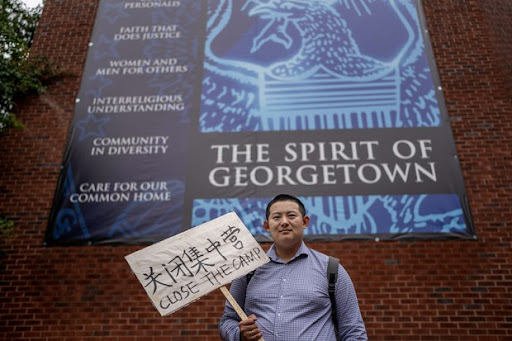Even in the United States Chinese international student Zhang Jinrui cannot escape the crosshairs of the Chinese Communist Party’s policies, after he learned that his family in China was targeted by state security police, who took his father in for questioning.
In conversation with Radio Free Asia (RFA), Zhang —who is studying law at Washington’s Georgetown University — said that his family was approached by authorities before his father was taken away for interrogation. They inquired about Zhang’s “level of patriotism” in addition to how he spent his time in the United States.
“The state security police knocked on our door and took my father away for lengthy questioning,” Zhang told RFA. “[They asked him] ‘Does this child of yours take part in pro-democracy activities? Do they usually love their country and the [ruling Chinese Communist] Party?’”
“If not, you have to teach him to love his country and the party better,” the police said, according to Zhang. “It’s not OK that he’s doing this, and it won’t do any good.”
According to Zhang, his father’s interrogation came after he participated in protests supporting the “white paper” movement in November 2022, and for standing in opposition to Beijing hosting the Winter Olympics. However, police did not contact him at the time.
Success
You are now signed up for our newsletter
Success
Check your email to complete sign up
“On the evening of June 29, I suddenly received a WeChat message from my sister saying ‘Contact me urgently, something happened,’” Zhang said. “The people from the police station had called my sister and asked about her [relative] in Washington, wanting to know if they took part in the Torch on the Potomac group, saying I was a key member.”
However, Zhang claimed that the group had not organized any activities, adding that Chinese authorities were also targeting families of students who have not participated in any form of activism.
The Torch of the Potomac is an organization set up by students at George Washington University and was designed to provide a safe space for Chinese students to freely express “political dissent” without fear of other pro-communist students, Voice of America (VOA) wrote.
“We want to provide Chinese students and scholars at George Washington University, as well as their peers in the diaspora, with a platform, social support and community independent from the Chinese Communist Party and its puppets. In addition, we welcome students from all backgrounds interested in Chinese culture, politics and identity,” a statement by the organization said on April 25.
READ MORE:
- Inside Beijing’s Stealth Infiltration: How the CCP Exerts Its Influence Across US Campuses
- Americans Support More Tariffs for Chinese Imports, Ban on TikTok: Reuters-Ipsos Polls
- Chinese Official Suggests Pro-Natalist Education for Elementary and Middle School Students as Birth Rate Dwindles
Beijing’s ‘long arm’
The Chinese Communist Party’s (CCP) “long arm” law enforcement continues to target activists from abroad, keeping a watchful eye on students who moved to other countries to experience freedom of speech.
However, as Sarah McLaughlin — senior scholar at The Foundation for Individual Rights in Education — warned, the harassment of the students’ families will greatly affect their ability to exercise said speech, even when safely away from their home nation.
She said that “speaking to foreign media” may land students in more trouble, especially those whose families were already being brought in for questioning.
“I know that that’s something that international students have run into before,” she said. “They’ve gotten in trouble when they returned home for things they’ve said online while in the United States.”
“There are definitely some real fears among these students, and there’s definitely self censorship,” she added.
However, other than police harassment, students must also worry about their own fellow peers on campus. Particularly, pro-Beijing students are being incentivized by the Chinese Students and Scholars Associations (CSSA) to report on activism far away from home.
“[The pro-Beijing students] even got in touch with the school, saying that the Chinese students who support democracy and oppose zero-COVID are racist,” Zhang said. “That’s why they set up the Torch of the Potomac, because a lot of their activities weren’t getting the support of the school.”
Zhang also reported that he was also a victim of harassment by the Association’s branch in Georgetown University.
“One person came over and harangued me, calling me a traitor and accusing me of getting money from the U.S. government,” he said.
McLaughlin suggested to U.S. universities to provide better support for international students, as well as “reporting mechanisms for transnational censorship” on campuses.
Last year, members of the Georgetown branch were sent by the Chinese Embassy to pull down posters set up by students opposing China’s hosting of the 2023 Winter Olympics, replacing them with posters denouncing the actions. The university’s president, Mark Wrighton, admitted in a statement that the removal “was a mistake.”
Donald Clarke, professor at the George Washington University Law School, said universities should not assume the CSSA “are broadly representative of all Chinese students on their campuses.” He did, however, say that the association was “weaponizing the language of social justice” to target critics of the communist regime.
“University administrators must understand that due to the Chinese government’s obsession with control, almost everything related to China becomes political,” Clarke said.
Despite the situation, Zhang wishes to remain vocal, hoping for “a better political system with a mechanism to solve problems.”
















